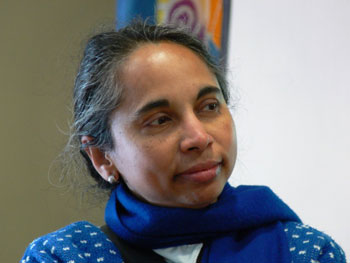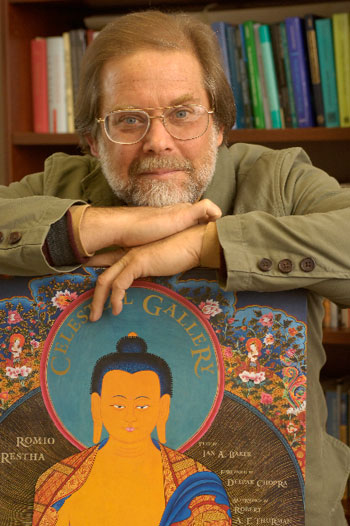
Dr. Vishaka Smith, one of the presenters at Seattle University's Eco-Sangha: Buddhism & Sustainability Conference, spoke on environmental and personal ethics from a Buddhist perspective.

Buddhism & Sustainability:
A Conference on Buddhist Ecology
Understanding and framing a spiritual response to the ecological challenges we face now and in the future was the focus of Seattle University’s weekend-long conference entitled “Eco-Sangha: Buddhism and Sustainability”. Two years in the planning, the conference brought together speakers from the fields of philosophy, religion, science, art, and hands-on sustainable farming.
Introducing the concept of “eco-sangha” was Rev. Don Castro of Seattle Betsuin Buddhist Temple. Castro offered an earth-centered interpretation of the Four Noble Truths, explaining that the suffering we confront—and need to recognize—is that of the entire planet and its beings. The causes of that suffering are profound and complex, arising from our deep interconnectedness. The path we must take to “cure” the earth’s suffering requires a “new asceticism” practiced in full awareness of our interconnections. “To be a Buddhist,” Castro asserts, “is automatically to be an ecologist and a conservationist.”
Dr. David Loy, professor of Religion and Ethics at Xavier University and author of Money, Sex, War, Karma: Notes for a Buddhist Revolution, posed the question, “Does Buddhism offer any special approach to the ecological crisis?”
A Zen practitioner, Loy suggested that there are profound parallels between our individual predicament, as Buddhism understands it, and our collective situation today in relation to the earth. Our un-awakened misunderstanding of “self” and the suffering that arises from a false sense of duality “hold true for our biggest collective sense of self: the duality between us as a species, Homo sapiens sapiens, and the rest of the biosphere.” Repairing the rupture between humans and the earth entails awakening fully to their non-duality. If we are able to do so, humanity can become “the collective bodhisattva of the biosphere”.

Dr. David Loy, professor of Religion and Ethics at Xavier University and author of Money, Sex, War, Karma: Notes for a Buddhist Revolution.
“Climate Change: A Karmic Revolution” was the topic of a presentation by Dr. Mark Unno, of the University of Oregon Department of Religious Studies. Rejecting the two extremes of “fight or flight” which characterize most responses to our current environmental challenge, and acknowledging that our usual problem-solving methods may be insufficient to deal with the scope of climate change, Unno proposed a Buddhist understanding that is both activist and transcendent, with karmic awareness at its fulcrum.
“On the one hand, we must do whatever we can on the stage of history, large or small. This includes everything from recycling efforts to the development of whole new ‘green’ sectors of public and private enterprise. On the other, we live in the humble awareness that all of our efforts may not be able to save life as we know it.”
Other presenters included Dr. Vishaka Smith, an environmental engineer and Theravadan Buddhist, and the Reverend Kosho Itagaki of the Northwest Zen Community. Smith spoke on Buddhism’s five basic precepts as the basis for living a non-harmful life. Rev. Itagaki offered an approach to ecology from a Soto Zen perspective, focusing on Dogen’s understanding of harmony with nature.
Dr. Saheed Adejumobi, Global African Studies, Seattle University, spoke on “Power Relations and the Ecologies of Freedom”, locating the dignity of labor in its relationship to the earth, time and history.
Many in the audience were moved by Naomi Kasumi’s artist’s talk about her work of the last nine years, which deals her with grief and loss over an aborted fetus. Kasumi is on the faculty of Seattle University’s Department of Fine Arts.
Margaret Pikarsky of Bee Heaven Farm, Florida, concluded the conference with a farmer-activist’s view of community supported agriculture and the challenges of operating an organic farm in the fragile south Florida ecosystem.
Seattle University philosophy professors Jason Wirth and Elizabeth Sikes, plus religion professor Sharon Suh and Eco-Sangha Seattle co-founder Bill Hirsch, were organizers of the conference.
For more information about Eco-Sangha Seattle, please visit: www.ecosangha.com.
Contributors: Bill Hirsch, Julie Welch.
Photos: Courtesy of Compassion Action Network,
Wisdom Publications.